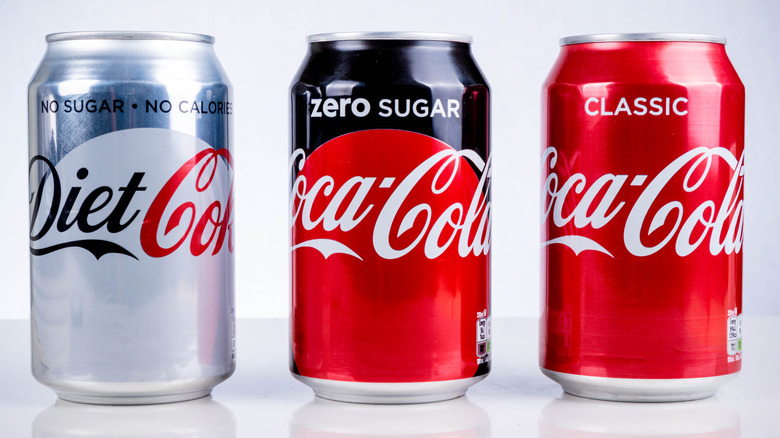
Coke Zero Sugar arguably boasts the most dedicated fanbase among Coca-Cola Company’s offerings. With the recent news of a revamp to the Coke Zero Sugar recipe, there is uncertainty about how the taste might change (CNN). Will Coke enthusiasts turn to Diet Coke, and if so, what distinguishes the two?
Coke Zero made its debut in the United States over ten years ago and was rebranded as Coca-Cola Zero Sugar in 2017 (Coca-Cola Company). The company informed CNN that the new version aims to taste more like classic Coke, describing it as “more refreshing and delicious.” Consumers will also notice a different color on the can.
Let’s analyze the components of Coke Zero Sugar and Diet Coke. Both the new and previous versions of Coke Zero Sugar are sweetened with a blend of aspartame and acesulfame K in the United States and Canada (via CNN), whereas Diet Coke solely uses aspartame (Coca-Cola Company). Otherwise, both Coke Zero Sugar and Diet Coke are free of sugar and calories, featuring a similar ingredient list.
Differences between Coke Zero Sugar and Diet Coke

Diet Coke has a higher caffeine content, with 46 milligrams per 12 ounces, and more sodium at 70 milligrams per 12 ounces (Diet Coke). Coke Zero Sugar contains 34 milligrams of caffeine per 12 ounces, 40 milligrams of sodium, 60 milligrams of potassium, and includes the additional ingredients of potassium citrate and acesulfame potassium (Coca-Cola).
However, the most notable difference between Coke Zero Sugar and Diet Coke may be their taste, influencing consumer preference. A past Huffington Post taste test in 2012 revealed that 54% of participants could distinguish between Diet Coke and the former version of Coke Zero. Whether these results will apply to the new debate between Diet Coke and Coke Zero Sugar is yet to be determined. The new Coke Zero Sugar formula is slated for release in the United States in July 2021, and in Canada by September 2021, according to CNN.




